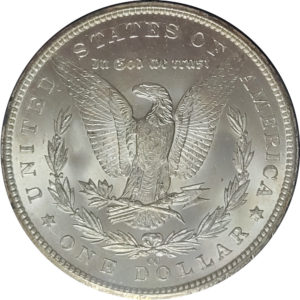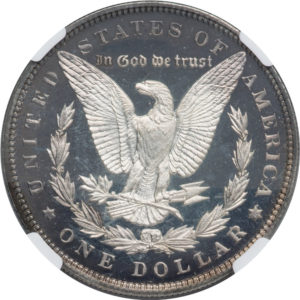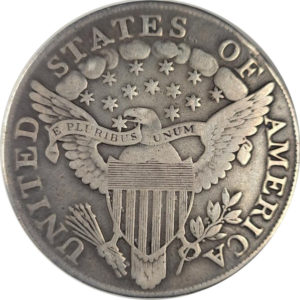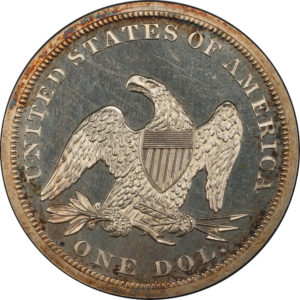1876-CC T$1 U.S. Trade Silver Dollar Carson City Mint.
Q. David Bowers and Mike Sherman write that the Trade dollar was first minted in 1873 in response to the need for a coin to compete with the Mexican “dollar” (actually the 8 Reales or Peso) in the Orient. Weighing 420 grains, or slightly heavier (1.8%) than a standard silver dollar, the Trade dollar was intended for export only. Despite this, they were legal tender in the United States until 1876, at which time Congress revoked their status. Quantity production continued through 1878, after which point only token quantities were made for proof sets through 1883 (the few pieces dated 1884 and 1885 are of dubious origin). In 1887, the law authorizing the Trade dollar was repealed, and the treasury officially redeemed all un-mutilated pieces.
The obverse depicts Miss Liberty seated on a bale of merchandise, her right hand holding a branch, her left hand holding a ribbon inscribed “LIBERTY, a sheaf of wheat behind, and the sea in front. IN GOD WE TRUST appears at the bottom just above the date. Stars surround the upper portion. The reverse depicts an eagle holding three arrows and a branch, with E PLURBUS UNUM on a ribbon above, 420 GRAINS, 900 FINE, below. The inscription UNITED STATES OF AMERICA and TRADE DOLLAR surrounds.
The Local Scene in Nevada
Following the Act of July 22, 1876, which eliminated the legal tender status of trade dollars, they began selling at a discount almost immediately. The August 3, 1876 issue of the Territorial Enterprise, Virginia City, Nevada, told of the situation (citation from Willem, The United States Trade Dollar): This newspaper is perhaps best known to historians today because of Samuel L. Clemens’ employment there.)
“A meeting of the retail dealers of Virginia was held last night in the rooms over the Delta Saloon. For some reason there was a small attendance, only 24 saloons being represented-or about one-seventh of the business. There was a great deal of buzzing going on before the meeting commenced, and the proper course to adopt was eagerly discussed.
“Mr. Adams stated that the object of the meeting was to get the voice of the saloon-keepers as to what course should be adopted with regard to trade dollars. He was in favor of discontinuing their acceptance altogether after the second day of next month …. Mr. Orndorff states that it was intended as a general meeting, and he desired to hear from all the whiskey men present. Mr. Vucovitch advocated the plan of refusing trade dollars altogether, and thought immediate action necessary. Mr. Oliver favored the 90 cents proposition and immediate action.
“Mr. Riorden gave an instance where a good customer one who would be liable at any time to throw down a five dollar gold piece if he wanted to drink-would get the worst of it. The liberal man puts out a piece of gold and takes his change in silver, while the mean man sells his gold for trade dollars and takes one of them to buy a drink. Under the present system he would get back a half, quarter, and a dime, and it would be cheaper to give the man his drink than to give him the change. A speaker said that he was in favor of discounting trades so much there could be nothing made by buying them with gold and paying them out.
“Mr. Sliter of ’66’ was called upon, but as he was the only representative of the two-bit houses (Most saloons charged 15¢ for a drink; “two-bit houses” charged 25¢.) present he declined to commit himself, saying only that he was in favor of the movement if the rest would stand in J.P. Penhal, commonly known as Captain Jack, thought trade dollars ought to be received for bills contracted during the past month, and Mr. Oliver said he was willing to take them for all that was owing him. On a motion by Mr. Orndorff, a resolution was adopted specifying that trade dollars should only be taken at 87-1/2.
“It was ordered by the meeting that the chair appoint a committee of four to obtain signatures to an agreement, The chair appointed a committee and instructed it to report at the same place of meeting this evening at half-past seven o’clock. After the agreement had been signed by the majority of those present, the” meeting was declared adjourned. Considering the fact that it was a crowd of liquor dealers, the meeting was a very dry one. Not one of them offered to ‘ring the bell (Treat the assembled guests to a round of drinks.) during the entire evening.”












